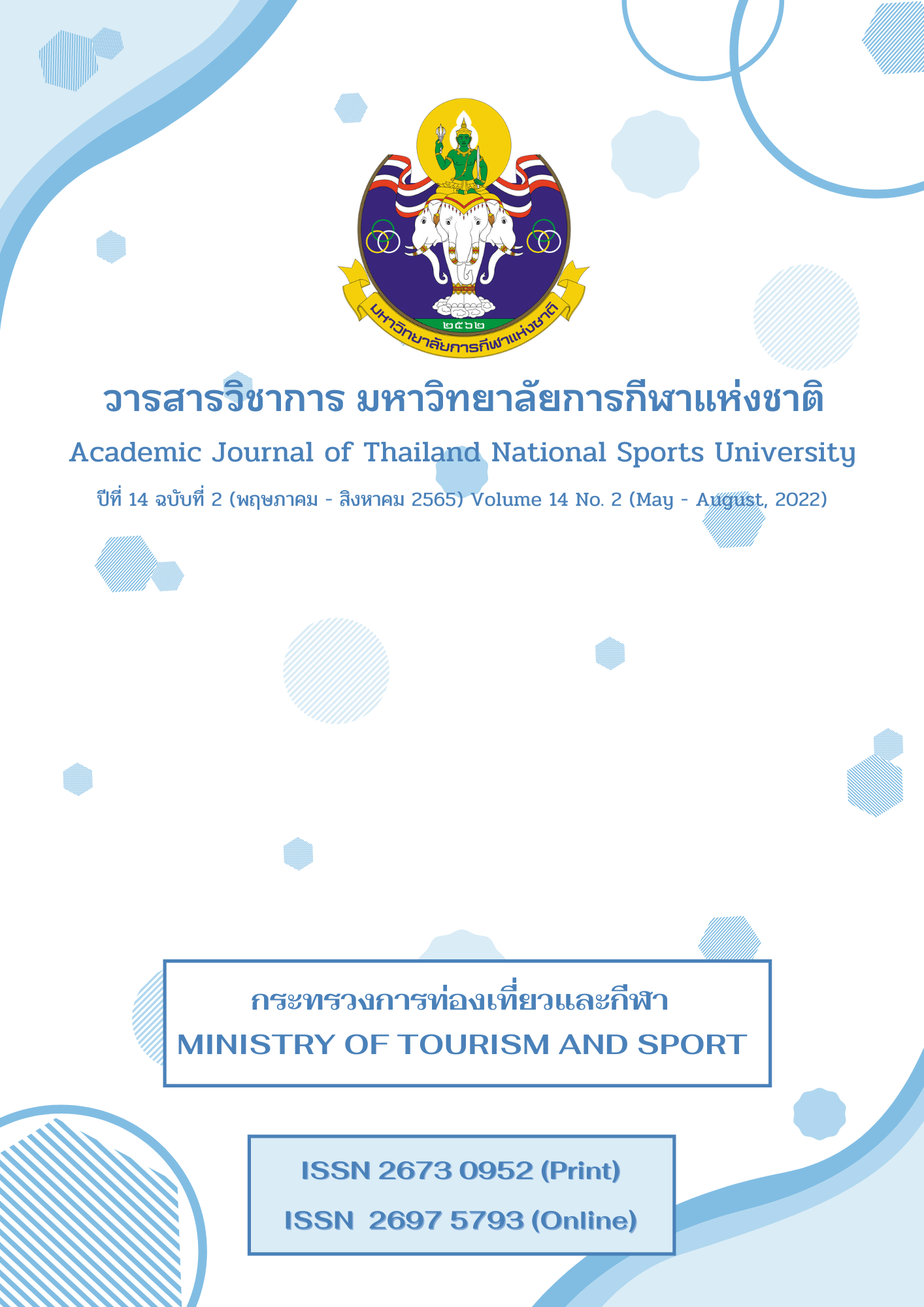DEVELOPMENT OF HEALTH LITERACY PROMOTING PROGRAM ABOUT PARTICULATE MATTERS FOR SECONDARY SCHOOL STUDENTS
Main Article Content
Abstract
The purpose of this research was to develop a health literacy promotion program about particulate matters for secondary school students. The research methodology was divided into 4 phases; phase 1, reviewing of the research literature on concept of particulate matters the health literacy promotion and health literacy assessment, phase 2, analyzing concept of Phenomenon Based Learning and Blended Learning. A health literacy promotion program about particulate matters, phase 3, an expert analysis of the quality of the program by five experts included 1) assessment form for content validity, activity components 2) content validity evaluation of 8 activities and 3) an evaluation form for content validity of the developed program. The results showed that index of congruence of the program consisted of the activity title, purpose, conceptual framework, and the steps in each activity were 0.82. This program had 8 activities i.e., 1) enhance knowledge 2) reliable channel 3) dust communication 4) my ability 5) fake or not 6) my decision 7) mind game and 8) สearn creatively. The average mean of index of congruence was 1.00. The program was set for 8 weeks, 2 days per week, and 1 hour per day. The index of congruencies of the overall program was 1.00. This program was determined to promote secondary school health literacy about particulate matters.
Article Details

This work is licensed under a Creative Commons Attribution-NonCommercial-NoDerivatives 4.0 International License.
The published article is a copyright of the Academic Journal of Thailand National Sports University. The passage appeared in each article in this academic journal is a perspective of each author which is not related to the journal. Each author is required to be responsible for all components of his/her own article. If there are any mistakes, each author must be responsible for those mistakes on his/her own.
References
Bureau of Epidemiology, Department of Disease Control. (2018). Surveillance situation of health effects from Air pollution, dust smaller than 2.5 microns in Bangkok and perimeter and risk area between January 2019 - 18 January 2020. Retrieved from https://th.city/mj0W3
Chatchawan Phetkong, & Pannee Banchonhattakit. (2019). Effects of health literacy promoting program with social media used on obesity prevention behavior among overweight mattayomsuksa 2 students. Journal of Health Education, 42(2), July – December, 23 - 32.
Chutima Jiamjai, Karunthara Boonchuaythanasit, & Prasertsak Kainakha. (2016). Effectiveness of health education program for health literacy development by cooperative learning to promote safety motorcycling behaviour of mathayomsuksa students, Benchamatheputit Phetchaburi School. Kasetsart Educational Review, 31(3), September – December, 205 - 217.
Department of health, Ministry of Public Health. (2017). Operating Health literacy and Health Communication. Retrieved from http://doh.hpc.go.th/data/HL/HL_DOH_drive.pdf
Greenpeace Thailand. (2018). World Air Quality Situation Report (2018): Global city and Region PM2.5 Ranking. Retrieved from https://www.greenpeace.or.th/s/right-to-clean-air/2018-world-air-quality-report.pdf
Health Education Division. (2018). Establishing and assessing health literacy and health behavior. Retrieved from http://www.hed.go.th/linkhed/file/575
Intira Robroo et al. (2011). Experiment of a blended instructional model for enhancing self - knowledge acquisition. Journal of Information, 12(2), July – December, 108 - 116.
Jessadakorn Thongnoi. (2014). Awareness of health impact from airborne particulate matters of primary school students in Phitsanulok province (Master’s thesis), Pibulsongkram Rajabhat University.
Ministry of public health. (2019). Health literacy and health communication. Retrieved from http://www.anamai.moph.go.th/ppf2017/Downlond/29/E0%B8%9A%E0%B8%B2%E0%B8%A2/32.pdf
Nattaya Kaewpipob. (2019). Effects of health literacy and self - efficacy developing program for promote pregnancy prevention behavior. Journal of Health Education, 42(1), January – June, 55 - 67.
Nutbeam D. (2008). The evolving concept of health literacy. Social science & Medicine, 67(12), 2072 - 2078.
Nutbeam D. (2015). Defining, measuring and improving health literacy. Retrieved from https://www.who.int/global-coordination-mechanism/news/Health-literacy-WHO-Geneva-Nov-2015.pdf
Pollution Control Department. (2019). Pollution Issues in Thailand 2019. Bangkok: Mongkhon Printing.
Srisuda Prompukdee, Karunthara Boonchuaythanasit, & Prasertsak Kainakha. (2017). Effectiveness of health education program using participatory learning process for health literacy development on physical violent prevention of secondary school students of Saraburi Primary Educational Service Area Office 2. Kasetsart Educational Review, 32(2), May – August, 144 - 150.
Ubonwan Chaimongkol. (2011). Awareness of health impact from airborne particulate matters among Prathom Suksa students in Chiang Mai province (Master’s thesis), Chiang Mai University.
Ungsinun Intarakamhang. (2017). Health literacy: Measurement and development. Behavioral Science Research Institute. Bangkok: Sukhumvit Printing.
Weerasak Jornburom. (2015). Factors associated with the participation of prevention and resolving of dust-caused health problem in Neuamuang sub – district Muang roi - et district roi - et province. The national and international conference & research presentation 2015 “create and development to approach ASEAN community II”, 12- 20.
World Health Organization. (2016). The mandate for health literacy. 9th Global conference on health promotion. Retrieved from https://www.who.int/healthpromotion/ conferences/9gchp/health-literacy/en/


